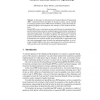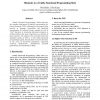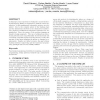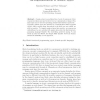124
click to vote
FPCA
1995
15 years 5 months ago
1995
In this paper we study the relationships between logic programming and functional programming, trying to answer the following basic question: to what extent is logic programming j...
114
click to vote
PADL
2000
Springer
15 years 5 months ago
2000
Springer
In this paper, we demonstrate how Functional Reactive Programming (FRP), a framework for the description of interactive systems, can be extended to encompass parallel systems. FRP ...
102
click to vote
ASWEC
2004
IEEE
15 years 5 months ago
2004
IEEE
"Totally Functional Programming" (TFP) advocates the complete replacement of symbolic representations for data by functions. TFP is motivated by observations from practi...
AGP
1998
IEEE
15 years 6 months ago
1998
IEEE
Parsing has been a traditional workbench for showing the virtues of declarative programming. Both logic and functional programming claim the ability of writing parsers in a natura...
134
click to vote
ERLANG
2003
ACM
15 years 7 months ago
2003
ACM
In this paper, some experiences of using the concurrent functional language Erlang to implement a classical vertical application, a risk management information system, are present...
107
click to vote
PADL
2004
Springer
15 years 7 months ago
2004
Springer
Abstract. A session type is an abstraction of a set of sequences of heterogeneous values sent and received over a communication channel. Session types can be used for specifying st...
100
click to vote
APLAS
2004
ACM
15 years 7 months ago
2004
ACM
With generic functional programming techniques, we have eased GUI programming by constructing a programming toolkit with which one can create GUIs in an abstract and compositional ...
111
click to vote
APLAS
2006
ACM
15 years 8 months ago
2006
ACM
This paper tackles a problem often overlooked in functional programming community: that of testing. Fully automatic test tools like Quickcheck and G∀ST can test first order func...
125
click to vote
PEPM
2007
ACM
15 years 8 months ago
2007
ACM
Functional Reactive Programming (frp) extends traditional functional programming with dataflow evaluation, making it possible to write interactive programs in a declarative style...
ICFP
2009
ACM
15 years 9 months ago
2009
ACM
The evolution of Web sites towards very dynamic applications makes it necessary to reconsider current Web programming technologies. We believe that Web development would benefit ...




